Dec 05, 2011
While ASCO represents oncologists on the national level, the Society’s state and regionally based affiliates represent the needs of this constituency on the local level. Aligning ASCO’s resources for the common good of oncologists is one way to influence the ever-changing face of health care. Recently, ASCO’s State/Regional Affiliates were invited to share the latest accomplishments and upcoming priorities of their local organization.

Association of Northern California Oncologists (ANCO)
ANCO currently represents 413 hematologists/oncologists throughout northern California in the community, government, and academic and large practice (Permanente) settings, which is the largest membership in the history of ANCO.
In 2011, ANCO successfully advocated on behalf of individual ANCO members and hematologists/oncologists in general before national professional–organizations, regional government third-party payers, and private third-party payers. In addition, ANCO successfully advocated for the passage of SB 866, which mandates the development and use of a standardized prior authorization form by all health plans and insurers.
ANCO also organized clinical educational programs (including San Antonio Breast Cancer Symposium Highlights, ASCO/Oncology Nursing Society Highlights) and professional educational programs (including Oncology Reimbursement 2011, Managing Medicare for the Practicing Oncologist) throughout the year and region.
Furthermore, the Journal of Oncology Practice (JOP) published, “Economic Assessment of Association of Northern California Oncologists Member Practices,” (Buell R, Falconer P, Gonzalez JL. J Oncol Pract. 2011;7:295-301), and Oncology Times published, “State Oncology Groups Advance Clinical Pathways,” (Butcher L. Oncology Times. 2011;33:14-16), which featured ANCO's payer-provider partnership strategy. ANCO conducted and published the results of its biennial Staff Salary Survey, and ANCO and the Medical Oncology Association of Southern California (MOASC) cooperatively launched the California Oncology Weekly e-publication.
In 2012, ANCO intends to help its membership adapt to a rapidly changing reimbursement landscape by keeping them informed with the latest information available.

Denali Oncology Group (DOG)
DOG successfully held its Annual Spring Business Meeting March 25-26, in Girdwood, Alaska. The theme, “Technology in Healthcare,” drew in speakers on the following topics:
As a result of the meeting, DOG’s medical librarian now attends the group’s weekly City Wide Cancer Conference to conduct timely literature searches and answer questions that arise at the cancer conference.
An important milestone for DOG was being accepted as a Civil Society participant at the United Nations High-level Meeting on Non-communicable Diseases, held in September 2011 in New York.
Looking ahead, 2012 will mark the DOG’s 5th anniversary as an ASCO State Affiliate. Goals of the Group include playing a bigger role in advocating for a healthier population by promoting healthier lifestyles and helping its members adopt electronic health records to improve patient care. DOG will also continue its legislative efforts and advocacy to ensure drugs are available for patients, and that doctors can successfully practice both clinically and economically. Finally, DOG hopes to spread enthusiasm and encourage more of its members to actively participate in and benefit from the chapter.
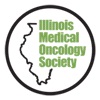
Illinois Medical Oncology Society (IMOS)
Members of IMOS scored a significant victory in 2011 in overturning an onerous payer requirement for submitting claims. Earlier in the year, Blue Cross Blue Shield of Illinois (BCBSIL) announced that effective July 1, oncology providers would be required to use National Drug Codes (NDCs) rather than J Codes when submitting claims for drugs administered in outpatient settings. BCBSIL subsequently delayed the effective date to September 1. Preparation for the conversion to NDCs created a summer-long, labor-intensive burden for all oncology practices. As a result of information collected, analyzed, and provided by a working group of IMOS members, as well as those who voiced their concerns directly, BCBSIL rescinded its requirement on September 20.
IMOS traditionally sponsors an educational program early in the year to provide fellows with information to assist them in their transition to independent practice, such as how to interview for and negotiate a contract for their first post-fellowship employment. In 2011, IMOS expanded its support by launching its first fellows’ research competition. The selection process culminated in a dinner meeting at the Metropolitan Club in downtown Chicago on August 25 to honor three award recipients: Oana C. Danciu, MD (University of Illinois at Chicago); Rupali Roy, MD (Northwestern University); and Manish R. Sharma, MD (University of Chicago). In addition to the dinner in their honor and the opportunity to present their research findings to other fellows, fellowship directors, faculty, and members of the IMOS Board of Directors, each award recipient received a stipend from IMOS.
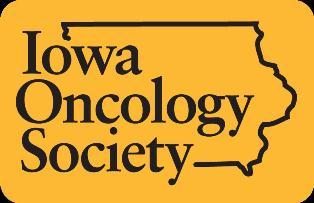
Iowa Oncology Society (IOS)
IOS is tackling the issue of drug shortages via a public relations campaign to inform the public about the crisis and urge support of SB 296/HR 2245.
Early in 2011, IOS Board of Directors wrote to Iowa members of the U.S. Congress, the FDA, and certain drug manufacturers about the shortages, advocated for passage of federal legislation, and encouraged IOS members to do the same.
Several months later, the IOS Board submitted a guest essay to the Des Moines Register, which was published in its entirety on October 28. The essay pointed out the irony of practicing in today’s oncology environment: “At the same time physicians are witnessing profound and far-reaching improvements in the care they can give to their patients, they are confronting a shortage of medicines that they have relied on for decades to treat cancer.” The Register responded with a November 3 editorial supporting IOS’ concerns about the shortages and urging government attention to the crisis.
After encouraging readers in Iowa’s capital city to contact policymakers in support of the federal legislation, IOS submitted similar letters to the editor of newspapers in communities in which Board members reside.
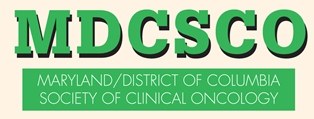
Maryland/DC Society of Clinical Oncology (MDCSCO)
In 2011, MDCSCO hosted unique opportunities to interact with key health care thought leaders and decision makers at the state and regional levels. Maryland Senator Edward J. Kasemeyer, Chairman of the Senate Budget & Finance Committee, served as the Society’s guest speaker at its Legislative Dinner on February 2. On April 13, MDCSCO hosted a panel discussion with Rex Cowdry, MD, MPH, Director of the Maryland Health Care Commission, and Robert Murray, MA, MBA, Executive Director of the Maryland Health Services and Cost Review Commission. Recently MDCSCO and ASCO partnered to host a membership dinner where Congressman Chris Van Hollen (D-MD) was to speak, along with ASCO CEO Allen Lichter, MD. Although Congressman Van Hollen was unable to be there at the last minute, the attendees were pleased to ask questions of Dr. Lichter and appreciated his responsiveness and interest in hearing their concerns.
Buoyed by record attendance at this year’s events, and most especially by heavy attendance at the membership dinner held in Chevy Chase, it is clear that MDCSCO has an opportunity to develop institutional memberships, including those outside of the current concentration in the Baltimore/Annapolis area. Simultaneously, MDCSCO will look to develop new associate membership programs.

Medical Oncology Association of Southern California (MOASC)
MOASC’s membership reached a total of 404 physician members in 2011, including 84 solo practitioners, 64 group practices, nine ANCO Members, two academic institutions, and three retired oncologists.
In 2011, MOASC created the MOASC Contracting Network, Inc. (MCN), to work with Cardinal Health Specialty Solutions to improve the quality and cost of cancer care by implementing, managing, and expanding use of clinical pathways, while ensuring appropriate reimbursement for members from private payers in California. The MOASC Purchasing Network, Inc. (MPN), continues to provide value to its 212 physician members, as a group purchasing organization.
Besides the Spring and Fall General Membership meetings, the year-end Administrator’s meeting, the Oncology Nurse Biotherapy Certification program, and the monthly LunchTime Series teleconferences in 2011, MOASC continued to fulfill its vision of promoting the continued education of physicians and their staff by presenting their first Billing 101 course and producing the California Oncology Weekly, a collaboration with ANCO.
MOASC continues to advocate on behalf of the California patients with cancer in Washington, D.C., and Sacramento, through national and state affiliations.
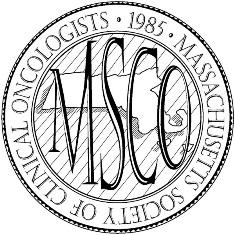
Massachusetts Society of Clinical Oncologists (MSCO)
MSCO held its Annual Meeting on November 19. Attendees heard an inspiring presentation by Peter McLaren Black, MD, PhD, on “New Developments in Brain Tumor Surgery.” Dr. Black is the Franc D. Ingraham Professor of Neurosurgery at Harvard Medical School and Founding Chair of the Department of Neurosurgery at Brigham & Women’s Hospital. Each year, MSCO presents The Audesse Award to recognize outstanding efforts to educate the public about cancer and to enhance and protect the quality of cancer care in Massachusetts. The award was named in honor of Nancy Achin Audesse, former state Senator from Lowell, Massachusetts, who sponsored the legislation that mandated Massachusetts insurers pay for off-label uses of cancer therapy drugs. This year’s recipient was Tom DesFosses, who in 2008 established the “A Reason to Ride” bike-a-thon to raise awareness and funds to support brain cancer care and research at Beth Israel Deaconess Medical Center. In 2003, Tom was diagnosed with primary central nervous system lymphoma and underwent aggressive chemotherapy treatment.
In addition, the MSCO Board of Directors established the Massachusetts Oncologist of the Year Award to honor the achievements of an individual whose research and innovations have had a transforming and lasting impact in areas of clinical oncology, cancer research, clinical trials, and patient advocacy activities or outstanding long-term service to MSCO and/or clinical oncology. The inaugural recipient was Arthur T. Skarin, MD, former Medical Director of Thoracic Oncology at the Dana-Farber Cancer Institute from 1995 to 2008 and Past President of MSCO. Dr. Skarin spent his career heavily involved in education, teaching and training over 400 fellows. In addition to over 155 publications in medical journals he is Editor of the Atlas of Diagnostic Oncology, recently completing the 4th edition. Dr. Skarin was Editor of the Diagnosis in Oncology section of the Journal of Clinical Oncology from 1997 to 2010. The MSCO Board was pleased to present him with this award at the MSCO Annual Meeting.
MSCO also launched a new website, which was a project taken on by several chapters.

Michigan Society of Hematology and Oncology (MSHO)
MSHO focused on moving its 2010 Strategic Plan forward by developing an updated legislative strategy for the Society. A legislative intern from the University of Michigan School of Public Health was recruited to target relevant pending legislation. She developed a catalogue of key committee members in the Michigan state legislature and cross-referenced the list with corresponding MSHO members within the lawmakers’ districts for effective outreach. She drafted a Society image piece to attach to MSHO letters on issues and leave behind at visits to legislators and their staffers.
Furthermore, MSHO members were surveyed on their interest and commitment to policy issues. A legislative committee was formed within the MSHO Board of Directors to review and recommend action on pending legislation. The MSHO Annual Meeting included a session, “What Meaningful Advocacy Looks Like,” to engage members in the process. The Society is also strengthening its communication vehicles to take advantage of the legislative tools and messaging provided by national organizations like ASCO.
One of MSHO’s goals in 2012 is to find ways to remain relevant to members who have transitioned from private practice to a hospital outpatient arrangement. The Society is expanding its services and communication vehicles to include more education on facility billing and designing programs for support staff to include issues and interests of those in the hospital outpatient setting.
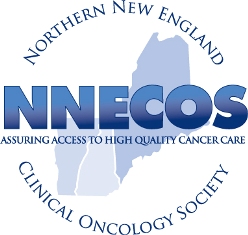
Northern New England Clinical Oncology Society (NNECOS)
In 2011, NNECOS launched its sustainability and revitalization efforts. Beginning with a Board retreat in January and an online survey of its members and constituents, the NNECOS Board of Directors asked, “How can NNECOS be more valuable to you and your institution?” The data collected was reviewed in the context of the Society’s reaffirmed mission and vision and made part of a long-term strategic plan to shape activities, initiatives, and resources to help solidify the Society’s relevance to oncology care in Northern New England.
Aside from two highly regarded annual educational meetings, notable accomplishments in 2011 include: the launch of an enhanced/interactive website on the ASCO-provided Wild Apricot platform; establishment of the NNECOS Collaborative Improvement Network for QOPI® as a core Society program; enhanced collaboration with advocacy groups and activities such as the Stowe Weekend of Hope; improved clinical trials support through the NNECOS blog; leadership outreach to payers to improve relationships; the launch of a Lunchtime Best Oncology Practice Series of teleconference/webinar presentations; and a bylaws amendment bringing three additional non-physician members to the Board to broaden representation to other health professionals.
As NNECOS looks ahead to its continued growth in 2012, the Society will sharpen its focus on bringing relevancy to its membership—a demographic that has been shifting from its private practice roots to hospital-based practice. With the expansion of its Board of Directors, NNECOS will look to broaden collaboration and increase relevancy.

Ohio Hematology Oncology Society (OHOS)
In 2011, Ohio Governor John Kasich signed into law a bill created by OHOS, which updated Ohio’s law on off-label indications to mirror federal standards.
“Science and modern medicine are continuing to find ways to use older drugs to treat cancer. And many drugs that are effective in some diseases are now being found to be effective treatment of other diseases, and this legislation will get Ohio current on off-label drug use in cancer therapy,” said state Representative and bill sponsor Jay Hottinger (R-Newark) in a Newark Advocate article.
The bill was unanimously passed by the House Insurance Committee, House floor, Senate Insurance Committee and Senate floor—a rare occurrence in Ohio’s General Assembly.
OHOS and the Ohio Cancer Society were the major proponents of the change. When CMS updated the list of approved compendia and peer-reviewed journals several years ago, states that had off-label state provisions became out of date. The bill includes language that allows state provisions to stay on pace with federal provisions in the future.
Article originally published in the October 12 issue of The ASCO Post
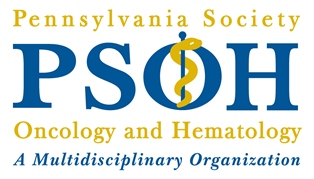
Pennsylvania Society of Oncology and Hematology (PSOH)
The PSOH Board of Directors recognized in 2011 the need to become more active in legislative affairs on a state and national level and regulatory affairs on the state level to address the needs of its members. Accordingly, the PSOH Board sent a letter to Pennsylvania Senator Patrick Toomey, a member of the Joint Select Committee on Deficit Reduction, asking him to maintain access to quality cancer care. Letters were sent to the Pennsylvania Department of Health on biosimilars and on oral cancer drugs for Medicaid patients. The Board also approved a letter to Pennsylvania Governor Tom Corbett that expressed concerns of possible health risks of hydraulic fracturing of the Marcellus Shale and recommended the development of a task force to monitor possible carcinogenic effects of this activity.
The PSOH Board of Directors’ major priority for 2012 will be membership retention and growth.

Association of Northern California Oncologists (ANCO)
ANCO currently represents 413 hematologists/oncologists throughout northern California in the community, government, and academic and large practice (Permanente) settings, which is the largest membership in the history of ANCO.
In 2011, ANCO successfully advocated on behalf of individual ANCO members and hematologists/oncologists in general before national professional–organizations, regional government third-party payers, and private third-party payers. In addition, ANCO successfully advocated for the passage of SB 866, which mandates the development and use of a standardized prior authorization form by all health plans and insurers.
ANCO also organized clinical educational programs (including San Antonio Breast Cancer Symposium Highlights, ASCO/Oncology Nursing Society Highlights) and professional educational programs (including Oncology Reimbursement 2011, Managing Medicare for the Practicing Oncologist) throughout the year and region.
Furthermore, the Journal of Oncology Practice (JOP) published, “Economic Assessment of Association of Northern California Oncologists Member Practices,” (Buell R, Falconer P, Gonzalez JL. J Oncol Pract. 2011;7:295-301), and Oncology Times published, “State Oncology Groups Advance Clinical Pathways,” (Butcher L. Oncology Times. 2011;33:14-16), which featured ANCO's payer-provider partnership strategy. ANCO conducted and published the results of its biennial Staff Salary Survey, and ANCO and the Medical Oncology Association of Southern California (MOASC) cooperatively launched the California Oncology Weekly e-publication.
In 2012, ANCO intends to help its membership adapt to a rapidly changing reimbursement landscape by keeping them informed with the latest information available.

Denali Oncology Group (DOG)
DOG successfully held its Annual Spring Business Meeting March 25-26, in Girdwood, Alaska. The theme, “Technology in Healthcare,” drew in speakers on the following topics:
- National Library of Medicine’s Disaster Information and Emergency Preparedness
- Bioinformatics in Personalized Medicine
- Role of Social Media in Health Care
- Adopting Medical Librarian in Clinical Rounds
- Adopting Health Care Technology
- WHO’s International Classification of Diseases (ICD) 10
- Accountable Care Organizations
As a result of the meeting, DOG’s medical librarian now attends the group’s weekly City Wide Cancer Conference to conduct timely literature searches and answer questions that arise at the cancer conference.
An important milestone for DOG was being accepted as a Civil Society participant at the United Nations High-level Meeting on Non-communicable Diseases, held in September 2011 in New York.
Looking ahead, 2012 will mark the DOG’s 5th anniversary as an ASCO State Affiliate. Goals of the Group include playing a bigger role in advocating for a healthier population by promoting healthier lifestyles and helping its members adopt electronic health records to improve patient care. DOG will also continue its legislative efforts and advocacy to ensure drugs are available for patients, and that doctors can successfully practice both clinically and economically. Finally, DOG hopes to spread enthusiasm and encourage more of its members to actively participate in and benefit from the chapter.

Illinois Medical Oncology Society (IMOS)
Members of IMOS scored a significant victory in 2011 in overturning an onerous payer requirement for submitting claims. Earlier in the year, Blue Cross Blue Shield of Illinois (BCBSIL) announced that effective July 1, oncology providers would be required to use National Drug Codes (NDCs) rather than J Codes when submitting claims for drugs administered in outpatient settings. BCBSIL subsequently delayed the effective date to September 1. Preparation for the conversion to NDCs created a summer-long, labor-intensive burden for all oncology practices. As a result of information collected, analyzed, and provided by a working group of IMOS members, as well as those who voiced their concerns directly, BCBSIL rescinded its requirement on September 20.
IMOS traditionally sponsors an educational program early in the year to provide fellows with information to assist them in their transition to independent practice, such as how to interview for and negotiate a contract for their first post-fellowship employment. In 2011, IMOS expanded its support by launching its first fellows’ research competition. The selection process culminated in a dinner meeting at the Metropolitan Club in downtown Chicago on August 25 to honor three award recipients: Oana C. Danciu, MD (University of Illinois at Chicago); Rupali Roy, MD (Northwestern University); and Manish R. Sharma, MD (University of Chicago). In addition to the dinner in their honor and the opportunity to present their research findings to other fellows, fellowship directors, faculty, and members of the IMOS Board of Directors, each award recipient received a stipend from IMOS.

Iowa Oncology Society (IOS)
IOS is tackling the issue of drug shortages via a public relations campaign to inform the public about the crisis and urge support of SB 296/HR 2245.
Early in 2011, IOS Board of Directors wrote to Iowa members of the U.S. Congress, the FDA, and certain drug manufacturers about the shortages, advocated for passage of federal legislation, and encouraged IOS members to do the same.
Several months later, the IOS Board submitted a guest essay to the Des Moines Register, which was published in its entirety on October 28. The essay pointed out the irony of practicing in today’s oncology environment: “At the same time physicians are witnessing profound and far-reaching improvements in the care they can give to their patients, they are confronting a shortage of medicines that they have relied on for decades to treat cancer.” The Register responded with a November 3 editorial supporting IOS’ concerns about the shortages and urging government attention to the crisis.
After encouraging readers in Iowa’s capital city to contact policymakers in support of the federal legislation, IOS submitted similar letters to the editor of newspapers in communities in which Board members reside.

Maryland/DC Society of Clinical Oncology (MDCSCO)
In 2011, MDCSCO hosted unique opportunities to interact with key health care thought leaders and decision makers at the state and regional levels. Maryland Senator Edward J. Kasemeyer, Chairman of the Senate Budget & Finance Committee, served as the Society’s guest speaker at its Legislative Dinner on February 2. On April 13, MDCSCO hosted a panel discussion with Rex Cowdry, MD, MPH, Director of the Maryland Health Care Commission, and Robert Murray, MA, MBA, Executive Director of the Maryland Health Services and Cost Review Commission. Recently MDCSCO and ASCO partnered to host a membership dinner where Congressman Chris Van Hollen (D-MD) was to speak, along with ASCO CEO Allen Lichter, MD. Although Congressman Van Hollen was unable to be there at the last minute, the attendees were pleased to ask questions of Dr. Lichter and appreciated his responsiveness and interest in hearing their concerns.
Buoyed by record attendance at this year’s events, and most especially by heavy attendance at the membership dinner held in Chevy Chase, it is clear that MDCSCO has an opportunity to develop institutional memberships, including those outside of the current concentration in the Baltimore/Annapolis area. Simultaneously, MDCSCO will look to develop new associate membership programs.
 | 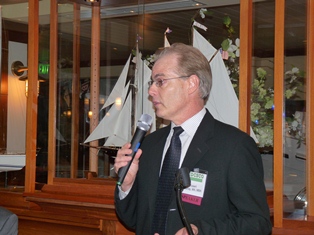 | 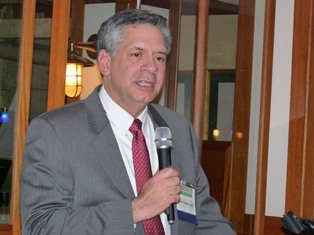 | ||
| Dr. Rex Cowdry at a MDCSCO event. | Mr. Robert Murray at a MDCSCO event. | Dr. Paul Celano, MDCSCO President, at a MDCSCO event. |
Medical Oncology Association of Southern California (MOASC)
MOASC’s membership reached a total of 404 physician members in 2011, including 84 solo practitioners, 64 group practices, nine ANCO Members, two academic institutions, and three retired oncologists.
In 2011, MOASC created the MOASC Contracting Network, Inc. (MCN), to work with Cardinal Health Specialty Solutions to improve the quality and cost of cancer care by implementing, managing, and expanding use of clinical pathways, while ensuring appropriate reimbursement for members from private payers in California. The MOASC Purchasing Network, Inc. (MPN), continues to provide value to its 212 physician members, as a group purchasing organization.
Besides the Spring and Fall General Membership meetings, the year-end Administrator’s meeting, the Oncology Nurse Biotherapy Certification program, and the monthly LunchTime Series teleconferences in 2011, MOASC continued to fulfill its vision of promoting the continued education of physicians and their staff by presenting their first Billing 101 course and producing the California Oncology Weekly, a collaboration with ANCO.
MOASC continues to advocate on behalf of the California patients with cancer in Washington, D.C., and Sacramento, through national and state affiliations.

Massachusetts Society of Clinical Oncologists (MSCO)
MSCO held its Annual Meeting on November 19. Attendees heard an inspiring presentation by Peter McLaren Black, MD, PhD, on “New Developments in Brain Tumor Surgery.” Dr. Black is the Franc D. Ingraham Professor of Neurosurgery at Harvard Medical School and Founding Chair of the Department of Neurosurgery at Brigham & Women’s Hospital. Each year, MSCO presents The Audesse Award to recognize outstanding efforts to educate the public about cancer and to enhance and protect the quality of cancer care in Massachusetts. The award was named in honor of Nancy Achin Audesse, former state Senator from Lowell, Massachusetts, who sponsored the legislation that mandated Massachusetts insurers pay for off-label uses of cancer therapy drugs. This year’s recipient was Tom DesFosses, who in 2008 established the “A Reason to Ride” bike-a-thon to raise awareness and funds to support brain cancer care and research at Beth Israel Deaconess Medical Center. In 2003, Tom was diagnosed with primary central nervous system lymphoma and underwent aggressive chemotherapy treatment.
In addition, the MSCO Board of Directors established the Massachusetts Oncologist of the Year Award to honor the achievements of an individual whose research and innovations have had a transforming and lasting impact in areas of clinical oncology, cancer research, clinical trials, and patient advocacy activities or outstanding long-term service to MSCO and/or clinical oncology. The inaugural recipient was Arthur T. Skarin, MD, former Medical Director of Thoracic Oncology at the Dana-Farber Cancer Institute from 1995 to 2008 and Past President of MSCO. Dr. Skarin spent his career heavily involved in education, teaching and training over 400 fellows. In addition to over 155 publications in medical journals he is Editor of the Atlas of Diagnostic Oncology, recently completing the 4th edition. Dr. Skarin was Editor of the Diagnosis in Oncology section of the Journal of Clinical Oncology from 1997 to 2010. The MSCO Board was pleased to present him with this award at the MSCO Annual Meeting.
MSCO also launched a new website, which was a project taken on by several chapters.

Michigan Society of Hematology and Oncology (MSHO)
MSHO focused on moving its 2010 Strategic Plan forward by developing an updated legislative strategy for the Society. A legislative intern from the University of Michigan School of Public Health was recruited to target relevant pending legislation. She developed a catalogue of key committee members in the Michigan state legislature and cross-referenced the list with corresponding MSHO members within the lawmakers’ districts for effective outreach. She drafted a Society image piece to attach to MSHO letters on issues and leave behind at visits to legislators and their staffers.
Furthermore, MSHO members were surveyed on their interest and commitment to policy issues. A legislative committee was formed within the MSHO Board of Directors to review and recommend action on pending legislation. The MSHO Annual Meeting included a session, “What Meaningful Advocacy Looks Like,” to engage members in the process. The Society is also strengthening its communication vehicles to take advantage of the legislative tools and messaging provided by national organizations like ASCO.
One of MSHO’s goals in 2012 is to find ways to remain relevant to members who have transitioned from private practice to a hospital outpatient arrangement. The Society is expanding its services and communication vehicles to include more education on facility billing and designing programs for support staff to include issues and interests of those in the hospital outpatient setting.

Northern New England Clinical Oncology Society (NNECOS)
In 2011, NNECOS launched its sustainability and revitalization efforts. Beginning with a Board retreat in January and an online survey of its members and constituents, the NNECOS Board of Directors asked, “How can NNECOS be more valuable to you and your institution?” The data collected was reviewed in the context of the Society’s reaffirmed mission and vision and made part of a long-term strategic plan to shape activities, initiatives, and resources to help solidify the Society’s relevance to oncology care in Northern New England.
Aside from two highly regarded annual educational meetings, notable accomplishments in 2011 include: the launch of an enhanced/interactive website on the ASCO-provided Wild Apricot platform; establishment of the NNECOS Collaborative Improvement Network for QOPI® as a core Society program; enhanced collaboration with advocacy groups and activities such as the Stowe Weekend of Hope; improved clinical trials support through the NNECOS blog; leadership outreach to payers to improve relationships; the launch of a Lunchtime Best Oncology Practice Series of teleconference/webinar presentations; and a bylaws amendment bringing three additional non-physician members to the Board to broaden representation to other health professionals.
As NNECOS looks ahead to its continued growth in 2012, the Society will sharpen its focus on bringing relevancy to its membership—a demographic that has been shifting from its private practice roots to hospital-based practice. With the expansion of its Board of Directors, NNECOS will look to broaden collaboration and increase relevancy.

Ohio Hematology Oncology Society (OHOS)
In 2011, Ohio Governor John Kasich signed into law a bill created by OHOS, which updated Ohio’s law on off-label indications to mirror federal standards.
“Science and modern medicine are continuing to find ways to use older drugs to treat cancer. And many drugs that are effective in some diseases are now being found to be effective treatment of other diseases, and this legislation will get Ohio current on off-label drug use in cancer therapy,” said state Representative and bill sponsor Jay Hottinger (R-Newark) in a Newark Advocate article.
The bill was unanimously passed by the House Insurance Committee, House floor, Senate Insurance Committee and Senate floor—a rare occurrence in Ohio’s General Assembly.
OHOS and the Ohio Cancer Society were the major proponents of the change. When CMS updated the list of approved compendia and peer-reviewed journals several years ago, states that had off-label state provisions became out of date. The bill includes language that allows state provisions to stay on pace with federal provisions in the future.
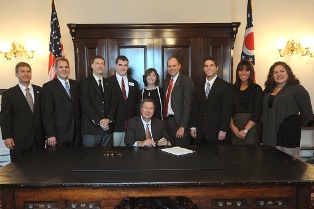 |
| Members of OHOS with Ohio Governor John Kasich. |
Article originally published in the October 12 issue of The ASCO Post

Pennsylvania Society of Oncology and Hematology (PSOH)
The PSOH Board of Directors recognized in 2011 the need to become more active in legislative affairs on a state and national level and regulatory affairs on the state level to address the needs of its members. Accordingly, the PSOH Board sent a letter to Pennsylvania Senator Patrick Toomey, a member of the Joint Select Committee on Deficit Reduction, asking him to maintain access to quality cancer care. Letters were sent to the Pennsylvania Department of Health on biosimilars and on oral cancer drugs for Medicaid patients. The Board also approved a letter to Pennsylvania Governor Tom Corbett that expressed concerns of possible health risks of hydraulic fracturing of the Marcellus Shale and recommended the development of a task force to monitor possible carcinogenic effects of this activity.
The PSOH Board of Directors’ major priority for 2012 will be membership retention and growth.
